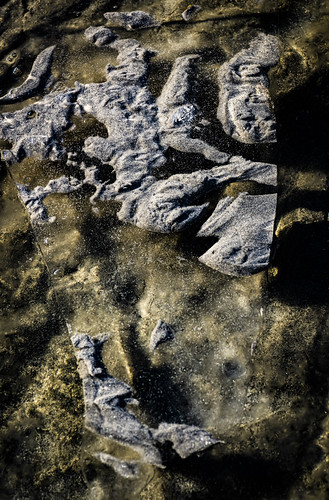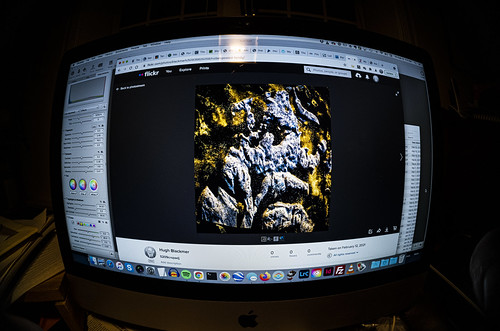A summary of morning encounters:
- in the parlance of our time
- Filboid Studge
- geniza(h)
- to wake a lexicographer
…which does surface the eclectic side of my …mind
A summary of morning encounters:
…which does surface the eclectic side of my …mind
I’ve started to build oook.info/lexicon/ to contain the project that I’ve been gathering material for at oook.info/etc/lexicon.html. I expect it will summarize a sprawling domain of explorations, just right for a winter month.
I just remembered another verse of Ken Stallcup’s wonderful anthropologist/linguist song, cited in a post last April and now updated with the missing bits included.
But today’s post really has to do with a succession of images emerging from an original capture yesterday at Drift Inn. The raw version as it came from the camera (a broken fragment of sea ice floating above sand):

and as adjusted (vibrancy, clarity, sharpness) and uploaded to Flickr:
and then I saw a figure within the original, and cropped and rotated:

And then I wondered about that baleful yellow eye at the top, and did the by-now-familiar copy-flip-join to produce a mirror image:

And while we’re considering the experimental, a new perspective arrived yesterday in the form of a 10 mm fisheye lens that has no very serious purpose (or not yet, anyway) but does that thing of making me think differently about what I see via the medium of the camera. Among the experiments I tried was this:

Now, that’s all very meta: a photograph of a photograph, and probably of no consequence… but another example of where the feet wander as one stumbles from thing to thing.
One more image from that lens, which has pretty startling quality for not much $$:

Much to chew upon in these three not-unrelated posts:
scientists have identified the individual neurons critical to human social reasoning, a cognitive process that requires us to acknowledge and predict others’ hidden beliefs and thoughts … Now that scientists understand the basic cellular mechanism that underlies human theory of mind, they have an operational framework by which to begin investigating disorders in which social behavior is affected.
There’s a hubristic flavor here, along with the journalistic handwaving, but the claim is at least interesting: certain mental processes seem to be locatable, and there’s an ‘operational framework’ to put to work on further problems. What can possibly go wrong?
What does a mirror look like when it reflects only itself, and no one is looking? … The essence of knowing is the mind perceiving external things and concepts and modelling them and assimilating those models into its schemes and structures and mental Minecrafts. Which means that knowing is an intrinsically separate and separating act; even knowing yourself takes parts of your self as objects, models them, and adds them to your miniature village of the mind. So what do you call the knowing that knows that the knower and the known are the same? The realization that all that is realized is all that realizes, and that at root the watcher is watching the watcher, and any plurality is just the reflector reflecting?
…
this idea of knowing that one is not separate from the ultimate unity of the universe (specifics depend on religion—Hindu, Buddhist, Jain, Sikh—and particular sect or school within the religion), well, that’s something that we particularly wanted to see as an exotic thing we could borrow from them, like a jewel from the East, the prize of a secret journey to find a holy man.
More familiar territory for some of us, awash in knotty paradox and the inventive genius of language.
the Iranian-speaking peoples were among the first to ride in chariots and to mount on horses, so we can think of them as being highly mobile. They were also responsible for the spread of key instruments and modes from the Middle East to Central Asia and thence to East Asia. So we can call the Iranian-speaking peoples masters of metallurgy, mobility, and music, but much more as well.
Words and concepts are substantial parts of that “much more as well”: see the ‘Selected readings’ links at the end of the post, and especially enjoy Faces of ‘Siberian Tutankhamun’ and his ‘Queen’ buried 2,600 years ago reconstructed by science.
And then add Andy’s post from yesterday. Whew.
“I” (me, my, etc.) figures prominently in this blog and in the thinking that precedes the construction of an entry. This seems a fact to acknowledge, rather than a failing to expunge or an error to vitiate, and reflects the personal nature of its contents, which emerge as a catalog of mental states and doings and projects, mostly quotidian and only occasionally nudging into territory of the sublime or transcendent. The author is no Bodhisattva:
no Bodhisattva who is a real Bodhisattva cherishes the idea of an ego-identity, a personality, a being, or a separated individuality
as Dr. W.Y. Evans-Wentz puts it in his Foreword to the Shambhala 1969 version of The Diamond Sutra.
My citation of Minor White’s dictum
All photographs are
self-portraits.
Which raises the question of the “self” if every _______ is a self-portrait. Assuming, of course, that there is a self. Or are there more than one “selves?” Nobody seems to agree on any of these possibilities.
Hm. I thought. Well, I’m a self, conscious of constructing myself over a lifetime, in continuing inner dialog that continues to be constructive, and aware that sometime it will all cease. But meanwhile it’s not an illusion, but rather a performance space in which various plays are enacted, alone and with others. I can be self-critical, self-absorbed, self-centered, self-involved… but those are choices made. I can also attend to the broader performances outside my own little theater of the mind, and choose to participate, or not. Choose to display and communicate, or not. Have close alliances with others, or not. Engage with external stimuli and events, or not. That choosing is done from within the wheelhouse of the mind, where attention may be directed as I choose.
And what’s the point of it all? It’s continuously interesting as a story with episodic complexities and pleasures/gratifications. My own performance space is happy, untrammeled, little bothered by slings and arrows of tragedy, suffering, dissatisfaction. In short, felicitous. Just why and how I’m not sure, perhaps more by “luck” and ultimately chance of the initial draw than by any inherent virtue, or any karmic head start.
I am at home in the Sensorium, attentive to Umwelt. The Dude abides.
I can imagine that there might not be “an ego identity, a personality, a being, or a separated individuality” just as I can imagine breathing into my toes, shoulder blades, etc., or that the rocks are peopled. It’s the imagining in which I take refuge.
All of that stuff emerges in the contemporaneous context of reading Madeleine Thien’s Poems Without an ‘I’ in the October 8th issue of NYRB, a review of 3 books on classical Chinese poetry, a subject in which I didn’t know I was interested. She avers that “The essential experience of Chinese poetry is all but untranslatable” (which set off a kerfuffle among linguists) and continues
the dimensionality of the Chinese writing system itself is akin to a forest we walk through (where the trees keep grouping and regrouping as we move among them), rather than a series of twigs arranged on a surface. Cheng observes that the writing system “has refused to be simply a support for the spoken language: its development has been characterized by a constant struggle to assure for itself both autonomy and freedom of combination.” To add to the constellations of meaning within any given poem, the disciplines of poetry, calligraphy, and painting are not considered distinct but rather facets of a single complete art.
Hinton notes that the Chinese language is not constructed around “a center of identity”; each time we see an “I” in a translation of Tang poetry, it was almost certainly not in the original text. Chinese grammar—a genderless and verb-tense-less system in which past, present, and future are inferred by context—allows for a complex blurring of subjectivities, which is not just a side effect but a fundamental aspect of the language. In Chinese poetry, fiction, and philosophy, the “I” is not the nerve center from which thought and knowledge begin.
The whole business of translation has amused me ever since high school Latin, and Thien’s characterization of David Hinton’s approach is elegant:
Hinton’s translations have always gone against the grain. He has been building, translation by translation, an English language for a Chinese conceptual world. His versions get closest to what makes Du Fu sublime for Chinese readers. He isn’t afraid to baffle us; the gaps remind us that we are only guests here, and that the poems do—indeed should—hover a bit beyond our grasp.
So does all this sort out the self/no-self question? Um, no, but it surely puts me on one side of the chasm.
As I recently commented to a friend via email, I’m realizing that I enjoy, indeed revel in, a broad interpretation of ‘folkloric’ which takes in “the parlance of our time” (Lebowski reference) in all its guises.
Among the tools at my fingertips:
…and others re: various dialects of English.
(for more on parlance, see In the parlance of our time and Repetition in The Big Lebowski)
An astonishing book has fallen into my hands and into my life: Michael Cooperson’s Impostures by al-Ḥarĩrĩ: Fifty Rogue’s Tales Translated Fifty Ways. It’s worth recording how that ‘fallen’ transpired: first, a blog post by Victor Mair at Language Log (which often delights, often mystifies), which pointed to a Wall Street Journal review by Sam Sacks (June 27) and provoked an Amazon order. One of the key hooks in Sacks’ review was reference to maqamat, glossed as ‘improvization’ and so directly parallel to a musical form I’m well acquainted with and always seeking broader understanding of. There’s also a clear link to my explorations of Oulipo (and OuXpos of various sorts) that are themselves a bit more remotely tied to my wanderings in Benjaminia, thus linking several threads of the last 6+ months of reading and thinking. Just what the resulting tissu or macramé amounts to, or might lead to next, is less than clear at the moment, but it surely harks back to Douglas Hofstadter’s Le Ton Beau De Marot: In Praise Of The Music Of Language, and to the grand problems of translation /übersetzung, ‘over-setting’/, and thence to ruminations on Culture and the deep complexities of understanding and en- and de-coding. I’m a wanderer in these forests, always open to new delights. And rogue threads are forever finding their way into the macramé, viz. Walt Whitman and Bob Dylan “I contain multitudes”. These are all two-bit epiphanies, bits of insight rather than pointers to grand revelations. And mostly probably intransitive, for my own amusement and edification and pleasure. Reason enough.
Today is Kate’s 50th birthday!

(see a Flickr album)
=====
It’s worth wandering into the lexicographical weeds to record the history of the Ouvroir [which I gloss as ‘Workshop’] in Ouvroir de Littérature Potentielle, as summarized in the [just-arrived] OULIPO: A Primer of Potential Literature, Warren Motte’s anthology of translations of oulipist texts:
…an ouvroir—a word that has fallen into disuse—once denoted a shop and, as late as the 18th century, a light and mobile shop made of wood, in which the master cobblers of Paris displayed their wares and pursued their trade. The word could also denote that part of a textile factory where the looms are placed; or, in an arsenal, the place where a team of workers performs a given task; or a long room where the young women in a community work on projects appropriate to their sex; or a charitable institution for impoverished women and girls who found therein shelter, heat, light, and thankless, ill-paid work, the result of which these institutions sold at a discount, not without having skimmed off a tidy profit, thus depriving the isolated workers of their livelihood and leading them (as it was charged) into vice. Later, and for a short time only, ouvroir denoted a group of well-to-do women seeking to assuage their consciences in needlework for the poor and in the confection of sumptuous ecclesiastical garments. Curiously enough, it was this last notion, the “sewing circle,” that prevailed in the minds of the Oulipians: just like those diligent ladies, Oulipians embroidered with golden thread… (Noël Arnaud’s Foreword to Motte, pg xii)
The lexical playfulness of Oulipo is what attracts me most (despite the lamentable impenetrability to me of the French texts), and what connects me to offshoots (or Potential offshoots) like OuPhoPo (Photography) and OuMuPo (Music). As Raymond Queneau put it,
The word ‘potential’ concerns the very nature of literature, that is, fundamentally, it’s less a question of literature strictly speaking than of supplying forms for the good use one can make of literature. We call potential literature the search for new forms and structures which may be used by writers in any way they see fit. (Arnaud again, pg xiii)
This exemplifies the OuMuPo connection:
Probably one of the craziest improvisation that we ever recorded. It was the last track we played during a week long session. We threw all the rules into the wood stove and blew out the windows. Robert Kehler came up with the title. But in fact, we do believe that children SHOULD be exposed to this sort of music, and especially the ones that are studying in conservatories…
Elsewhere I’ve noted my personal entanglement with OuPhoPo, to which constructions like this advance my claim:

and
and
and
This morning, while waiting in the barn for today’s Zoom yoga session to start, I gathered up a few word books in the general realm of American English and one fell open to a map of isoglosses, which immediately called to mind a song written Donkey’s Years ago by my dear friend Ken Stallcup, who said that he got one good song out of every career. I quarried the mind for all that I could remember of the text as I lay on the mat, and here it is (there might be verses I haven’t remembered, indeed I hope there are…):
Anthropologist pen in hand
Now you’re standing here on my land
You to me are but a passing breeze
Kroeber, Lowie, Leach and Levi-Strauss
and even Malinowski have stayed in my house,
Now that you’ve got your data, where’s my pay?
Dialects run along isogloss bundles
Leaving little wavy lines across the land
And everybody knows they must be documented carefully
Fron the Andaman Islands to the Rhenish Fan
Academics flow in a circular motion
Hurrying and scurrying across the Earth
With money from Ford and it’s all very interesting
But other than that, tell me what is it worth?
Other than that, tell me what is it worth?
At work upon several future posts in these realms.
I’m working in the direction of a posting on books about American English, but along the way I encounter all manner of things that divert and inform and goad and send me haring off into wanton serendipities. The Language Log blog is dependable that way, and today’s post on Ancient Chinese mottos is a case in point. It has to do with a text from ca. 700 BCE, and ends with this deliciousness:
To do this kind of high level translation requires hard work going through old annotations and commentaries. To make the English felicitous demands inspired creativity and a high level of Sprachgefühl.
Yeah, I know that word, but was hazier than I might have been:
intuitive feeling for the natural idiom of a language.
“it’s not genes or culture but Sprachgefühl that sets the French apart from the Finns, and the Russians from the Romanians”the essential character of a language.
“each language has its own personality, or Sprachgefühl, which limits its speakers to a certain mode of thought”
(https://www.lexico.com/definition/sprachgefuhl)
And, just because I can, I looked it up in the German Wikipedia:
Als Sprachgefühl bezeichnet man das intuitive, unreflektierte und unbewusste Erkennen dessen, was sprachlich als korrekt (in Wortwahl und Grammatik) bzw. als (situativ und kontextuell) angemessen oder aber als falsch bzw. unangemessen empfunden wird. Geprägt wird es insbesondere im Zuge des Erwerbs der Muttersprache, wobei Herkunft, soziales Umfeld und Bildung und die entsprechenden sprachlichen Erfahrungen des Kindes eine maßgebliche Rolle spielen. Durch intensive sprachliche Erfahrungen in der alltäglichen (auch medialen) Kommunikation, wozu auch literarische und andere Leseerfahrungen gehören, kann das Sprachgefühl aber auch in späteren Jahren trainiert und modifiziert werden.
The problem with the American English books is that there are so many, and they are so various: descriptive, evaluative, jocular, narrow, broad, thick, thin… each has something to add, and I’m still wrestling with a typology. And I’m so damned Sprachgefühl re: American English. So I’ll be back to that subject.